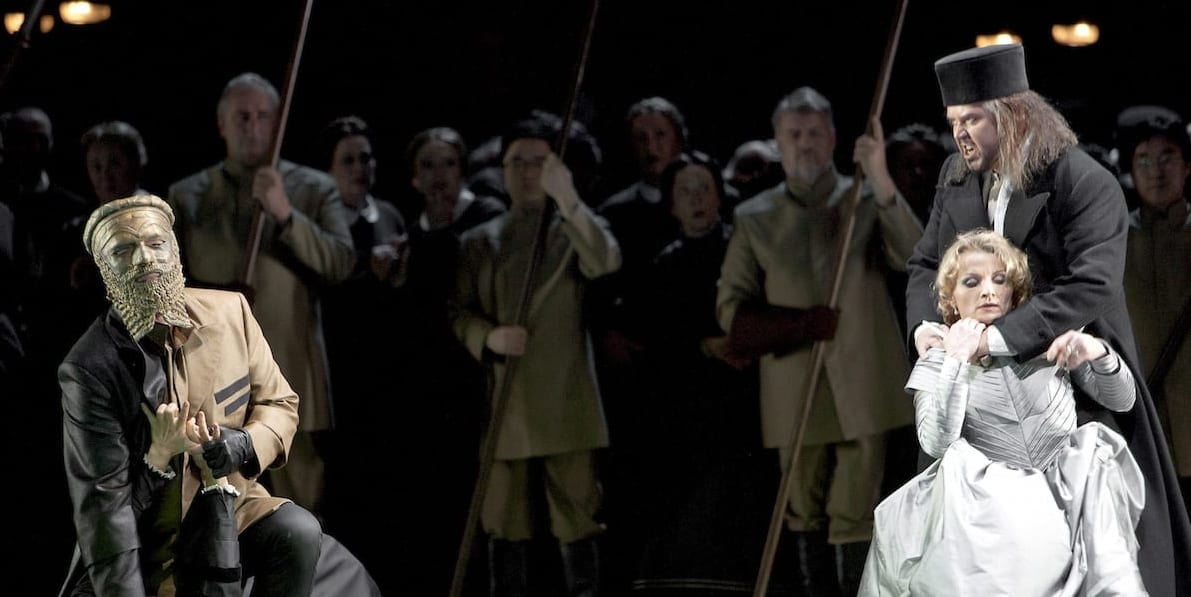The tower of Zion is under attack. Death is only a heartbeat away if you are considered to deserve it. The Hebrews claim their land, risking their lives against the Assyrians in Babylon. Imprisoned by the walls of Babylon’s pagoda, the opponents face their futures and their freedoms, which all rely on the great king.
In one of his most performed operas, his breakthrough success, Verdi breaks with the customs of Italian opera of his youth. Nabucco has frequently been directed as contemporary art in the name of politics for its traditional tale of unrequited love bound to the power of faith. Thanks to Verdi’s preference for enormous images, the main cast is expanded by the choir of the Hebrew slaves. Carlo Montanaro conducts Va, pensiero just as dynamic as the singers’ voices flow from their wish into the desire to reclaim their country. And in this production, the choir are great and a real protagonist!
In this story, the obedient Fenena (Jana Kurucová) is just a slave to the king’s will. Her sister Abigaille (Anna Pirozzi) on the other hand, receives no love at all from him. Because she turns out to have been born a bastard from a slave mother, her father neglects her, Ismaele (Attillio Glaser) chooses Fenena over Abigaille and even the renegades exploit her only to rage against the Jews. Her fury evolves; the opera chronicles the collapse that shall be accomplished by her against the king. By manipulating her father’s pride, his powers are trapped as well as determined to bring imminence to Israel. Anna Pirozzi is far more able to project her brokenness in both her enactment of the wicked daughter as well as by straining the complete soprano range. It works just like an accident perceived just by its sounds; the more you want to turn away from it, the more you are drowning in it. Since father and daughter are so alike, their relationship cannot resolve into reconciliation, but the opera’s plot is elaborated as an interpersonal catastrophe that, unfortunately, operates against the peaceful unification of two peoples.
Instead of portraying the title character as having a split personality divided between his perception of himself as a sovereign, a religious and fanatic, Amartuvshin Enkhbat remains sane. Unfortunately, he is not able to personify the charisma of a God-like king in his performance. Merciful, he crawls up the tower to regain at least his powers as a sovereign over both the Jews and the Assyrians. Steady as his representation of Nabucco, his deep voice reinforces his solid point of view as the rightful king. In opposition, Zaccaria’s (Mika Kares) occurrence in addition to his vibrant baritone expose himself as the mightier leader of his people, because it echoes meaningfully beyond the stage. Saints preserve us, we will find unity of the people against all odds!
The production seems to focus on other things than the far-reaching consequences of a family conflict that is both one of the many layers in Solera’s libretto and a central theme. Keith Warner describes his showcase as partaking of Verdi’s initial desire to perform King Lear during his lifetime. When you give it thought, it becomes clearer that this staging rather provides a space for the epic fight between a father and his daughters than a podium for patriotic announcements or political protest. Abigaille’s energetic arias are most convincing and her appearances and the king’s responses brilliantly performed. It is easy to comprehend why in both cases they are losing their minds.
Still, due to its spectrum of interpretations, the opera manages to reference more than its biblical background and heritage. Are we to ask ourselves whether we are experiencing similar impulses of religious and racial prejudice up until today? Isn’t Nabbuco the perfect representation of the quirks of the fate of our leaders and how subordinates are bound to act as they please? The opera may even be an issue of the nuclear family – in the end, it might become a decision between construction and deconstruction of society.
Nabucco’s redemption is ultimately successful. However, Abigaille will not be forgiven. She is forever outcast to the Wailing Wall of her royal provenance. But I will give you that in secret trust: she might be better off far from this madding crowd. May those who have sinned be raised up to heaven instead?

